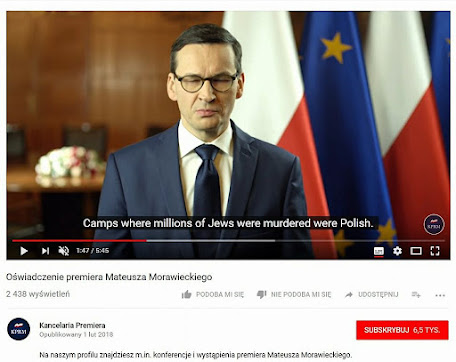How a single word missing in subtitles caused a nation-wide backlash
What can happen if one word is missed in translation? In some cases, the context could probably allow the reader to still get a general understanding of the sentence, right? But what if the word that is missing is ‘not’? This can definitely cause a problem.
In February 2018, Polish Prime Minister’s Office posted a video on YouTube. In that video, the Prime Minister talks about rather delicate matters including the Holocaust and concentration camps. 1 minute 45 seconds into his speech, he says:
“Obozy, w których wymordowano miliony Żydów nie były polskie" which means “Camps where millions of Jews were murdered were not Polish”.
However, anyone who wanted to watch that speech with English subtitles would see something different, actually the opposite of what was said in the video:
This mistake was quickly noticed by the online community and the storm begun. Shortly after, the subtitles have been turned off and the Prime Minister’s Office posted a statement on Twitter.
Which could be translated as:
“We want to inform that incorrect translation into English language in the Prime Minister’s statement @MorawieckiM arose as a result of YouTube’s automatic translation feature. All subtitles under that video have been turned off, we are working together with YouTube platform to solve this problem.”
YouTube apologized for the error. However, the criticism towards the Prime Minister’s Office kept coming regardless.
The Tweet aimed to put the blame entirely on technology. However, the question frequently asked was who allowed the information published by the Prime Minister as a representative of the country to be translated by YouTube algorithms. The statement does include an apology, just the intention to somehow resolve the issue. The speech was addressed in major part to the Polish nation and it might have been upsetting for some to know that such misinformation has been presented to the international audience. It depends on the point of view and personal opinions to decide whether the apology should be part of that statement.
The mistranslated sentence seems to be one of the key statements of the speech. It also referred to topics that are delicate and significant not only from Poland’s perspective and therefore might be researched by foreigners. It is also an issue that keeps arising in international relations.
Why was that error so significant?
The aim of that statement was to remind what is Poland’s view on the phasing regarding concentration camps. The government has been fighting for years against any statements that suggested that any of these places were “Polish” rather than on the areas occupied by the Nazis during the WW2. The same government has even introduced a law regarding these sort of phrases (more on that topic on here).
What can we learn from this? First of all, it proved that technology can be very helpful, but it is not perfect and most certainly should not be relied on fully in terms of accuracy in translations. That applies especially to the situations where such accuracy is very important and any errors may have potentially damaging impact on relationships, or in this case even international relations.
Statement saying that “Camps where millions of Jews were murdered were Polish” seemingly expressed by the Prime Minister in a video posted on official account could impact the reputation of the entire country. Therefore, it is very important to ensure that the audience receives the message in a way it was meant to be received and later might then be evaluated in various ways depending on the audience.
In this case, what was meant and intended was not what reached the English-speaking audience. However, there is some common ground and understanding about that topic in Poland and internationally and that is why this has been detected as a mistake so quickly and the news about Polish Prime Minister’s “admission” had not spread across the international media. This situation could have escalated if not for the previously established rapport but it should be treated as a lesson. Nowadays, when English language is often a bridge in communication internationally, especially in Europe, the need for accurate translations should not be underestimated in all aspects, the language itself as well as intercultural competence to avoid misunderstandings.
Link to the video (in Polish): https://www.youtube.com/watch?v=cH6hduUPfCU&t=118s
References:
https://twitter.com/PremierRP/status/959193834860220419?ref_src=twsrc%5Etfw%7Ctwcamp%5Etweetembed%7Ctwterm%5E959193834860220419%7Ctwgr%5E%7Ctwcon%5Es1_&ref_url=https%3A%2F%2Fwiadomosci.gazeta.pl%2Fwiadomosci%2F711488422972331skandaliczny-blad-w-napisach-do-oredzia-morawieckiego-kancelaria.html
https://economictimes.indiatimes.com/magazines/panache/some-famous-instances-where-translating-software-caused-trouble/articleshow/63091571.cms?from=mdr
https://www.nytimes.com/2018/02/06/world/europe/poland-death-camp-law.html
https://www.business-standard.com/article/news-ians/youtube-apologises-for-polish-pm-translation-error-118020400052_1.html
by Paulina





Comments
Post a Comment